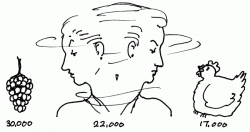Surprise! Grapes are more complicated than you!
Q. Which has more "protein-coding genes," as geneticists refer to the more important ones? a) a fruit fly, b) a grape, c) a chicken, d) you –G. Marx
A. Though the human genome was pretty well sequenced by 2001, gene count estimates continue to fluctuate, says Tina Hesman Saey in Science News magazine. Beginning in the millions in the 1960s, the number shrank to hundreds of thousands by the 1990s, now down to barely tens of thousands.
Viruses, the simplest living entities, have only a handful of genes. But as scientists now believe, the number of genes in a species bears little relation to its size or complexity. A grape, for instance, has an estimated 30,000 genes compared to a human's 22,000, a chicken's 17,000, a fruit fly's 15,000– though these are just "draft genomes" that may be substantially revised in the future. This puts you "somewhere between a grape and a chicken," as it has whimsically been characterized.
Where the number will finally settle is anybody's guess. There could be thousands more than the current approximation, remarked University of Maryland geneticist Steven Salzberg, who added, "That would be a surprising result, but we like surprises in science."
Q. How do magicians make you think you've made a free choice when in fact you're doing their bidding? –H. Houdini
A. Called "forcing," this allows the trickster to know in advance what card you'll choose from a deck, which item you'll select from an array on a table, say Stephen Macknik and Susana Martinez-Conde in Sleights of Mind: What the Neuroscience of Magic Reveals About Our Everyday Deceptions. "The mentalist is in complete control making you think he can read your mind," they add.
One classic method is the "magician's choice," where no matter what you choose, the magician calls the shots by how he verbally responds. For example, if he puts two cards face down on the table and wants you to choose the one on the right, he'll say "choose either one."
If you then choose the one on the right, he goes on with the trick. If you choose the one on the left, he'll say, "Good, you keep that one card and I'll use the remaining one."
Thus he forces the card he wants. You can call it verbal flim-flammery or a savvy sleight of mind. Either way, it works like magic.
Q. After your bridge club switches over from manual shuffling to a computerized card-dealing machine, members begin noticing abnormal suit distributions. Suspicion immediately falls on the computer. Wouldn't a predictable machine have trouble generating truly randomized orderings? –E. Hoyle
A. That's not likely the problem, says University of Tasmania's Neville Holmes in Computer magazine. Although not perfectly random, computers do a much better job "shuffling" cards than the typical human dealer.
As Laurie Kelso reported in the Australian Bridge Federation's newsletter, theoretically a deck of cards requires seven "riffle" shuffles to completely undo any residual effects from the previous deal.
"Since most manual shuffling is at best cursory,” she writes, “it’s really of little surprise that the results are sometimes flatter than the truly random hands produced via computer generation." It seems the bridge club had simply gotten used to poor shuffling!
~
Send Strange questions to brothers Bill and Rich at [email protected]
